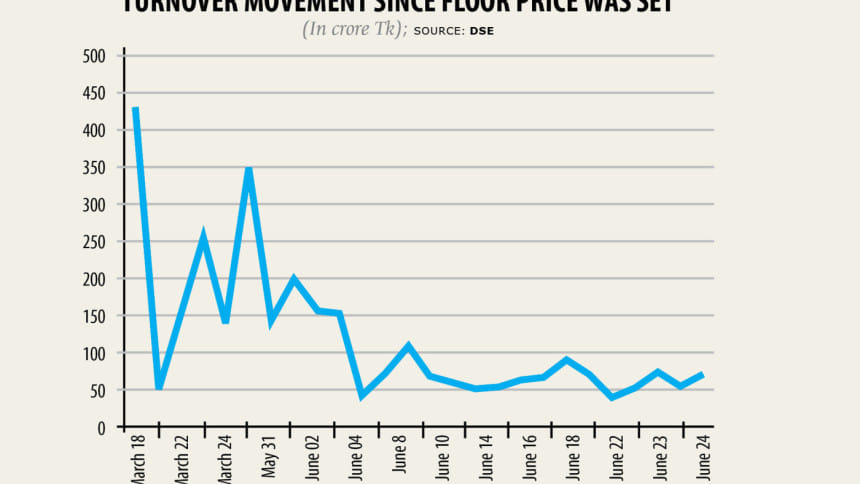Banks ready to invest Tk 1,650cr in stocks once floor price is lifted

Fourteen banks have together formed a Tk 1,650 crore fund to invest in the stock market but they are now waiting for the lifting of the floor price that the market watchdog set for all stocks earlier.
Bangladesh Securities and Exchange Commission set the floor price for all stocks based on the average price of the past five days on March 19, in order to stop the market slump amid the coronavirus pandemic.
But the DSEX, the benchmark index of Dhaka Stock Exchange, plummeted 4.46 per cent to hit a seven-year low of 3,603 points on March 18, just a day before the floor price was set.
"So we are waiting to see how much it slumps and what effect the market forces have on the stocks once the floor price is lifted," said the managing director of a state-run bank preferring anonymity.
"We wanted to invest, as the index plunged to a seven-year low. But the index was in a declining trend before the floor price was set," said the official of the bank, which also formed such a fund of Tk 200 crore.
"Till there is an understanding on the effect of the market forces on the stock price, we cannot buy stocks with people's money," he said.
"When the floor price is lifted and the market forces get the index to evolve, then we will buy stocks. With purchases the index will also go up on its own. This will be the market's real scenario," he added.
The 14 banks which have formed the special investment fund have taken approval from their boards and informed Bangladesh Bank but are yet to invest, confirmed a top official of the central bank preferring anonymity.
The banks are Sonali, Janata, Agrani, Rupali, NCC, Shahjalal, One, United Commercial, Mercantile, Pubali, City, Exim and two other scheduled banks.
As Bangladesh Bank gave them incentives on investing in the bearish stock market, they are coming forward, the BB official said.
On February 10, the banking watchdog announced a package for banks, allowing each to set up funds worth Tk 200 crore by taking the funds from the central bank through repo.
Repo refers to a system of repurchasing treasury bills from banks to lend money. The banks will have to pay 5 per cent interest for the fund and the credit tenure will be until February 2025.
The funds of Tk 200 crore would not be accounted in the market exposure, meaning the limit on banks' investment in the market, according to the Bangladesh Bank direction.
The central bank official said the banks have taken the approval in March, right after which the stock market closed thanks to the government leave to contain the Covid-19, so they did not get the chance to start investing.
They will invest when they think their money is comparatively safe, he added.
"As the stock prices have come down we have formed a fund to inject in the stock market," said Mohammed Rahmat Pasha, managing director of UCB Capital, a subsidiary of United Commercial Bank.
"But the stock prices are not yet controlled by market forces, so we are waiting to see the demand-supply based stock prices," he said.
"Our analysis shows a number of stocks are waiting to adjust to the demand-supply based market, so why will we buy the stocks now?"
A top official of a private bank said his bank wants to enrich its portfolio with some well-performing stocks and this was the perfect time as many companies' price-earnings ratio has fallen to 7 to 8.
When a potential company's price to earnings ratio falls under 10, then it is considered as a safe investment, according to market analysts.
Analysis shows that these well-performing companies' earnings will fall due to the economic contraction amid the pandemic, so their stock price also needs to be adjusted, the banker said.
"But the stock market is not run on a demand-supply basis, so we are investing money but keeping room to invest further," he said, adding that the DSE index did not fall as much as world stocks had in the pandemic.
The stock markets around the world started to plunge from late February when the virus began to spread globally. The fall lasted until late March.
India's BSE Sensex dropped 35 per cent to 25,981 points, the US's S&P 500 index slumped 32.96 per cent to 3,337 and Eurozone's Euro Stoxx 50 fell 37 per cent to 2,385 during the time.
The DSEX gave up 16 per cent to settle in the same time.
"This is not a sustainable way to stop the falling of an index artificially," the banker added.

 For all latest news, follow The Daily Star's Google News channel.
For all latest news, follow The Daily Star's Google News channel. 



Comments